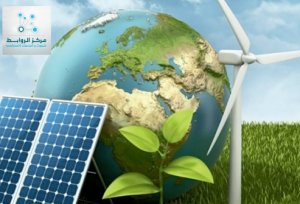By: Shatha kalel
As the world faces increasing environmental challenges, the push toward green energy is more important than ever. Renewable energy sources such as solar, wind, and hydropower are not only vital in combating climate change but also have the potential to drive significant economic growth. Transitioning to green energy can bring about profound benefits for the global economy, from job creation to energy independence, while reducing harmful environmental impacts.
The Economic Impact of Green Energy
Job Creation
The renewable energy sector is one of the fastest-growing job markets in the world. As investments in green energy expand, there is a growing demand for skilled workers in solar panel installation, wind turbine maintenance, battery production, and grid management. According to the International Renewable Energy Agency (IRENA), the renewable energy industry could create nearly 30 million jobs by 2050. This shift not only boosts employment but also creates opportunities in areas that have been hit hard by the decline in traditional fossil fuel industries, such as coal mining.
Energy Independence
One of the key economic advantages of green energy is the potential for energy independence. Countries that rely heavily on imported fossil fuels are vulnerable to price fluctuations and geopolitical instability. By investing in renewable energy infrastructure, nations can reduce their reliance on foreign energy sources, stabilizing their economies and improving national security. Countries like Germany and Denmark are leading examples, having invested heavily in wind and solar energy to reduce their dependence on imported oil and gas.
Lower Energy Costs
Renewable energy technologies are becoming more affordable, and in many cases, they are now cheaper than traditional fossil fuels. Solar and wind energy costs have dropped dramatically over the last decade, making green energy an increasingly attractive option for both consumers and businesses. By adopting renewable energy sources, households can reduce their energy bills, and companies can lower their operational costs, leading to broader economic savings. In the long run, this shift will free up resources that can be reinvested into other areas of the economy.
Innovation and Investment Opportunities
The green energy transition is driving technological innovation and attracting significant investment. From battery storage systems to energy-efficient building materials, the demand for sustainable solutions is spurring new advancements in technology. Governments and private companies are pouring billions of dollars into research and development, paving the way for future economic growth. Investors are increasingly moving their funds toward renewable energy projects, as the sector presents long-term, stable investment opportunities.
Environmental and Health Benefits
A cleaner environment results in lower healthcare costs, as reducing air and water pollution leads to fewer respiratory and cardiovascular diseases. The economic savings from a healthier population are substantial, as healthcare expenses are a significant burden on many economies. By promoting green energy and reducing reliance on fossil fuels, governments can not only protect the environment but also save billions in healthcare costs.
Challenges and the Path Forward
While the economic benefits of green energy are clear, the transition is not without challenges. Developing countries, in particular, may face difficulties in financing the necessary infrastructure and training the workforce needed to support a green economy. Additionally, the fossil fuel industry remains a powerful force in many economies, and political resistance to change can slow the pace of renewable energy adoption.
However, governments worldwide are increasingly recognizing the importance of green energy and are implementing policies to promote its growth. Carbon pricing, tax incentives, and subsidies for renewable energy projects are helping to level the playing field and encourage investment in sustainable technologies. International cooperation will be essential in ensuring that the global economy benefits from the green energy transition while mitigating the risks for countries that are heavily reliant on fossil fuels.
Conclusion: A Win-Win for the Economy and the Planet
The promotion of green energy is not just an environmental necessity—it’s an economic opportunity. By investing in renewable energy, countries can create jobs, boost innovation, and reduce energy costs, all while protecting the planet. As we move toward a greener future, the economic benefits of green energy will become increasingly apparent, paving the way for a more sustainable and prosperous world.
Economic Unit/North America Office
Al Rawabet Center for Research and Strategic Studies

